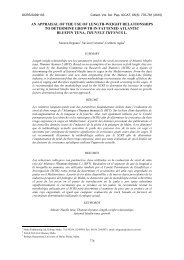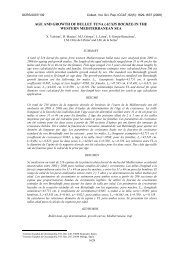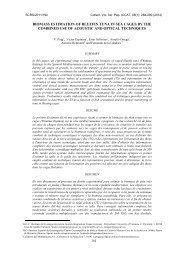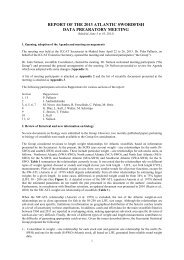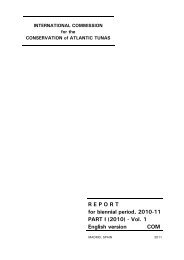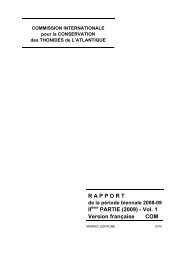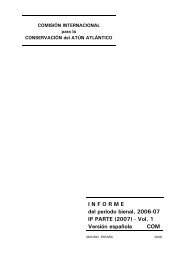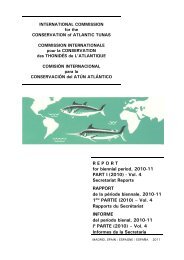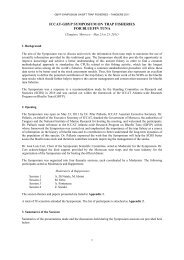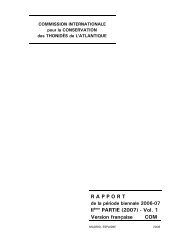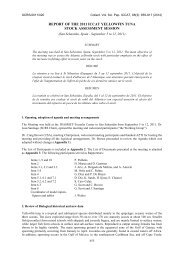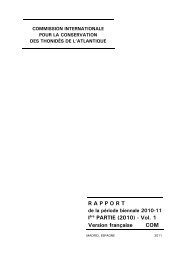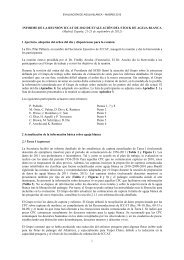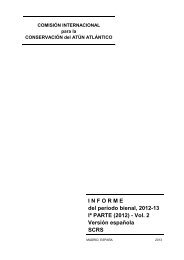E - Iccat
E - Iccat
E - Iccat
Create successful ePaper yourself
Turn your PDF publications into a flip-book with our unique Google optimized e-Paper software.
OPENING ADDRESSES & STATEMENTS<br />
accordance with its legislation. In addition, no Belizean fishing vessel is targeting regulated tuna and tuna-´like<br />
species within the ICCAT Convention area.<br />
In response to concerns over the level of albacore catches reported by St. Vincent and the Grenadines in 2001,<br />
this country took action to rectify this issued during the first half of 2002. St. Vincent and the Grenadines is also<br />
improving its statistical reports.<br />
In conclusion, both Belize and St. Vincent and the Grenadines are now complying fully with ICCAT<br />
conservation and management measures, or at the very least, are doing so at levels comparable to those achieved<br />
by ICCAT Contracting Parties. Furthermore, the recent accomplishments by Belize and St. Vincent and the<br />
Grenadines have required considerable deployment of resources by these two developing States. The<br />
Commission will recall the 2002 recommendations to suspend the sanctions imposed on these two countries by<br />
January 2004, unless documentary evidence is presented to indicate non-compliant activities. Neither State has<br />
received any evidence to show that it has failed to complete the necessary actions required to bring its fishing<br />
practices into conformity with ICCAT conservation and management measures.<br />
Noting all of the above, CARICOM asks the Commission to life, and not simple suspend, the trade sanctions<br />
currently imposed on these countries by 1 January 2004.<br />
Complementary measures: Besides the imposition of trade sanctions on exporting countries, CARICOM asks the<br />
Commission to consider and develop additional complementary methods of dealing more directly and<br />
completely with the problem of over-fishing. The greater burden of conservation action should be placed on<br />
developed States, which have more resources available to ensure stricter monitoring and enforcement of ICCAT<br />
regulations.<br />
Consistency and transparency: CARICOM notes that the SCRS is able to obtain data on Atlantic bigeye tuna<br />
and eastern Atlantic bluefin tuna from fleets categorized as “NEI” (Not Elsewhere Included). While the scientific<br />
data cannot be used to identify countries fishing in contravention of ICCAT measures, ICCAT has established<br />
statistical document programs for monitoring international trade of the two fish stocks in question. The<br />
continued use of the “NEI” category by the SCRS therefore implies a breakdown in the implementation of these<br />
statistical document programs, or the application of different standards to different fleets. If the latter is true, it is<br />
not fair that some countries are sanctioned by ICCAT because of alleged illegal fishing activities, while others<br />
are not identified by ICCAT but allowed to continue fishing these species without agreed catch allocations.<br />
Cooperating Party status applications: Two CARICOM countries, Belize and Guyana, have submitted<br />
applications for ICCAT Cooperating Party status, for consideration by the Commission in 2003. Belize has<br />
clearly demonstrated its commitment to comply fully with ICCAT conservation and management measures, as<br />
evident from the remedial actions described earlier. CARICOM therefore trusts that the Commission will<br />
respond favorably to Belize’s application, in order to encourage the continuation of the strong compliance<br />
actions being implemented by this country.<br />
Guyana’s waters are very rich in living marine resources and, at present, Gu yana has substantial fisheries for a<br />
range of marine resources, including sharks. In respect of its shark fisheries, it should be noted that Guyana is<br />
working to improve reporting of catches at the individual species level. To date, Guyana has not made use of the<br />
tuna and tuna-like resources present in its offshore waters. As a developing State, Guyana needs to explore and<br />
develop the full potential of these additional offshore large pelagic fish resources. As a coastal State, Guyana is<br />
also entitled to harvest the available stocks of the species concerned, and has a responsibility to optimize the<br />
usage of the resources within its EEZ in accordance with international law. However, given the migratory nature<br />
of these resources, Guyana appreciates the need to establish suitable sharing arrangements with other harvesting<br />
countries.<br />
In its application to ICCAT, Guyana signaled its firm commitment to respect the Commission’s conservation and<br />
management measures. Firstly, Guyana recognized the Commission’s authority for the management of tuna and<br />
tuna-like resources within the Atlantic Ocean and adjacent seas. Secondly, Guyana’s application indicated a<br />
clear intention to cooperate fully with ICCAT to ensure coordinated development of Guyana’s offshore large<br />
pelagic fisheries. To the extent so far necessary, Guyana has made every effort to comply with ICCAT´s<br />
statistical reporting and compliance requirements. Noting this, and the fact that the Commission has not had<br />
cause to query any of Guyana’s large pelagic fishing activities, CARICOM looks forward to positive<br />
consideration by the Commission of Guyana’s application.<br />
71



